Walking Wounded Only!
| When the New Zealand Government called for volunteers for the 1st Echelon on the 12th of September 1939, Arthur J was quick to respond. Arthur entered camp on the 3rd of October and trained to become part of the 6th field ambulance. In camp he was to learn the principals of military discipline that would be tested to the extreme during the evacuation of Greece in 1941. | |
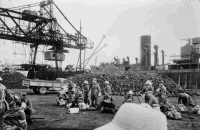 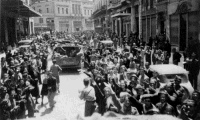 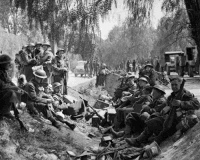 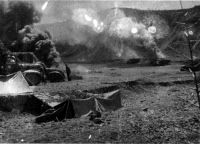 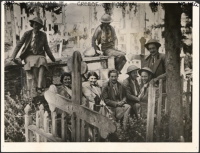 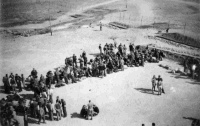 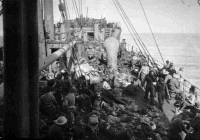 | The Second New Zealand Exeditionary Force [2NZEF] was sent to Greece as part of Operation Lustre. This Operation was devised by Churchill and the British Cabinet in response to pledges made in 1939 to assist Greece if threatened with invasion. On the 6th of April 1941, New Zealand clashed with the Nazi war machine for the first time as Hitler unleashed his unbeaten Air Force and Armoured Divisions into Northern Greece. German superiority in equipment and numbers swiftly overwhelmed the British and Commonwealth forces. By the 12th of April, the 2NZEF were forced to join the Australians in a fighting withdrawal while the Royal Navy prepared for an evacuation. This was the first engagement that New Zealand and Australia fought as the Australian and New Zealand Army Corps [ANZAC] since World War One. The ANZAC identity had been forged in WW1 on the shores of Gallipoli, another Mediterranean gamble conceived by Churchill. In an ironic twist, the first embarkations were to leave Greece on the night of the 24th and 25th of April. By the 28th the Royal Navy had completed the main evacuation of 40,000 soldiers but not without loss. The German Luftwaffe would claim at least 26 troop-laden ships. Patrick: Once you got overseas, did you understand the reasons for so much emphasis placed on discipline? Was all the parade ground work that important? Arthur: To obey orders, yes! I made one big blue (mistake) there, not obeying orders. During the evacuation of Greece we were evacuating the hospital and the King of Greece’ boat the "Helios" came in. The order went out that it was only supposed to be the walking wounded from the hospital to go on, and I was told it was only walking wounded! The ones that were left behind with the hospital, they were going to be prisoners of war. And of course different blokes, two blokes in particular who couldn’t walk, begged me to get them down there onto the boat. So I helped them into the ambulance, kept mum about it, got them down and helped them up the gang plank. Now there was a barge between where the Helios was moored, and the gang plank went across the barge onto the Helios. I got them across the gang plank and I sat them down on the deck of the Helios. I talked to a bloke later that was also on the Helios, an English bloke, and his advice was that if you were going to jump off the side of a boat don’t have your chin strap of your tin hat underneath your chin, that rim around the top will damn near tear your head off as you hit the water. Patrick: Did you get into trouble for getting those guys onto that ship? Arthur: No. I did it. They asked me to and I gave them a hand. Patrick: You said you made a blue not obeying orders, that was noble what you did. Arthur: No, it was supposed to be walking wounded only, and I ignored the order. They weren’t walking wounded, they couldn’t move. I got them over and sat them down on the deck there. We went back into the centre of Athens, to the medical centre there, to find out where we were to go. That was the medical personnel, the blokes in the ambulance. Then the Stukas came in and drive bombed the harbour, three of their bombs hit the Helios. We went down again to pick up the survivors and we got one. There was one bloke to pick up there and take back to hospital. Patrick: How many survivors do you think there were? Arthur: I wouldn’t have a clue. I wouldn’t have a clue. The bloke that I talked to that was there, like I said he jumped over the side with the tin hat on and boots and everything, he had a life jacket on and he swam across the harbour and got out the other side. But I know those two blokes I picked up wouldn’t have had a show. 291 New Zealanders were killed on the Greek Mainland and subsequent evacuation. 387 were wounded. Arthur was one of the 1,826 New Zealanders taken prisoner. |